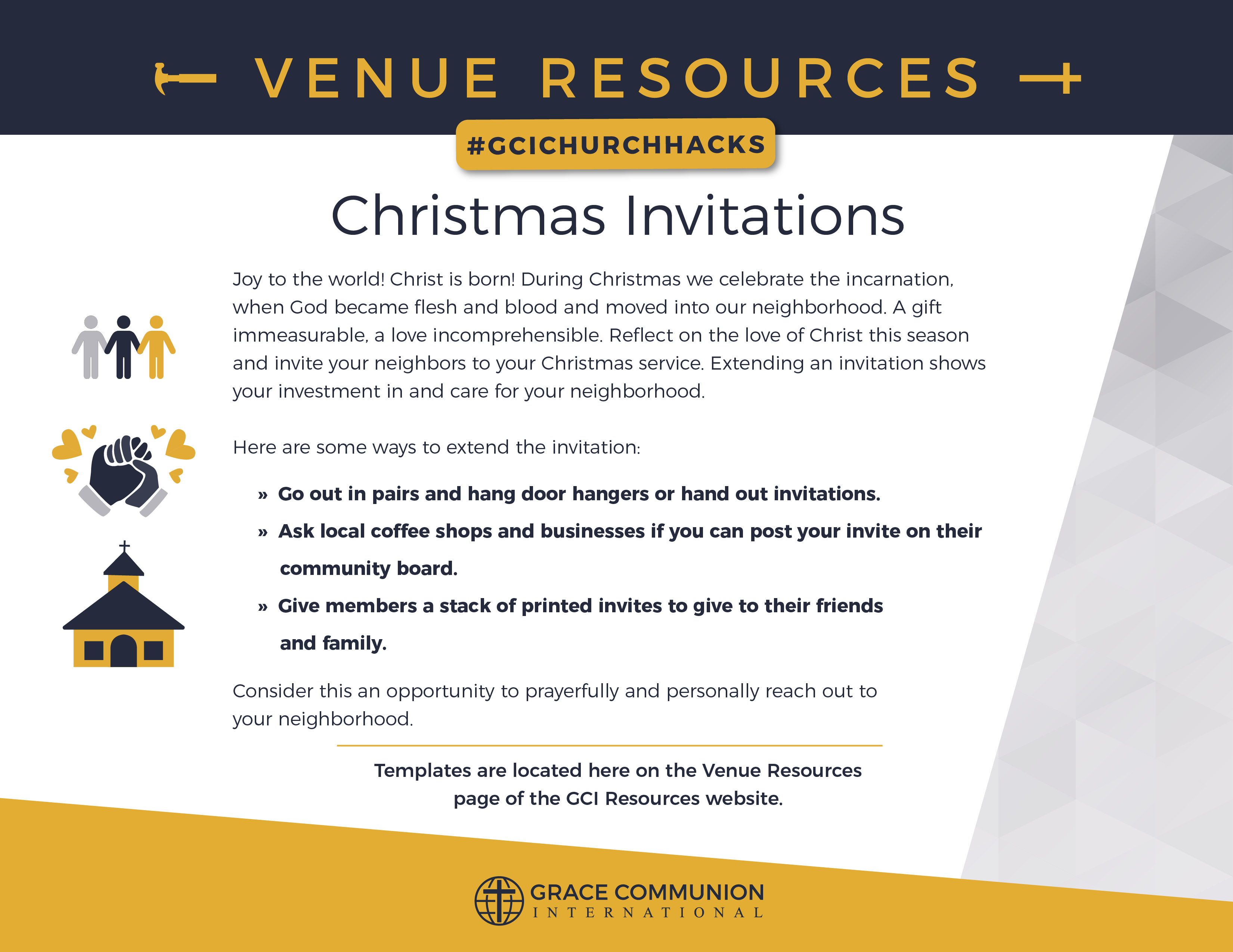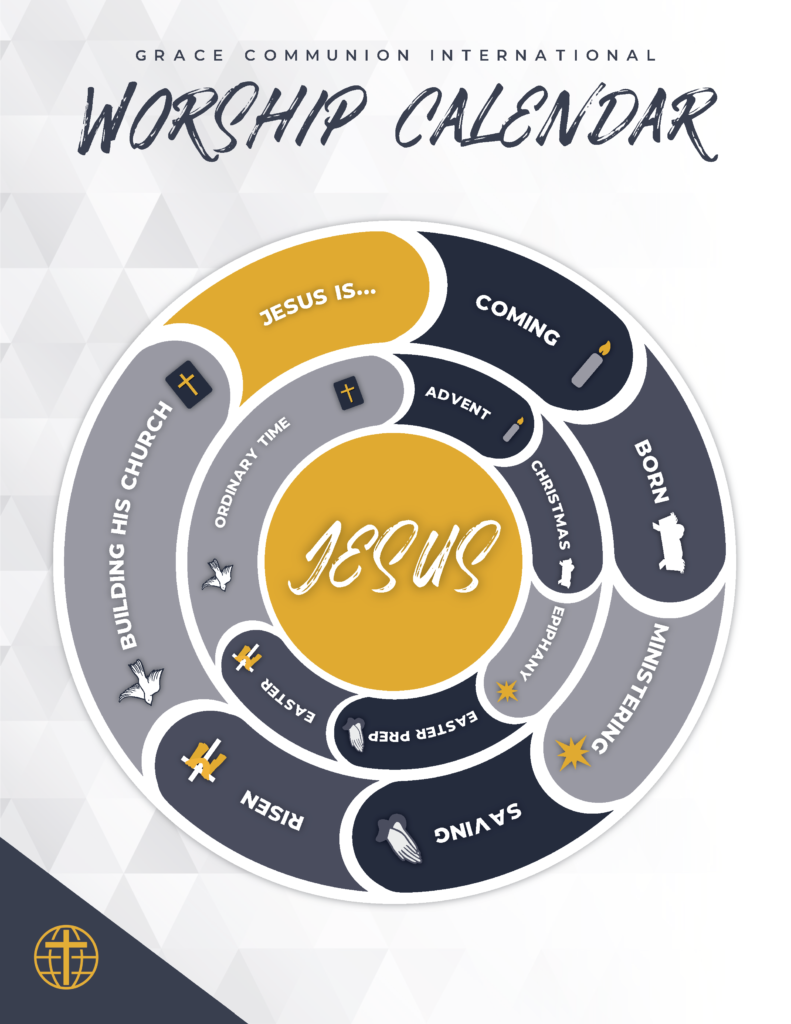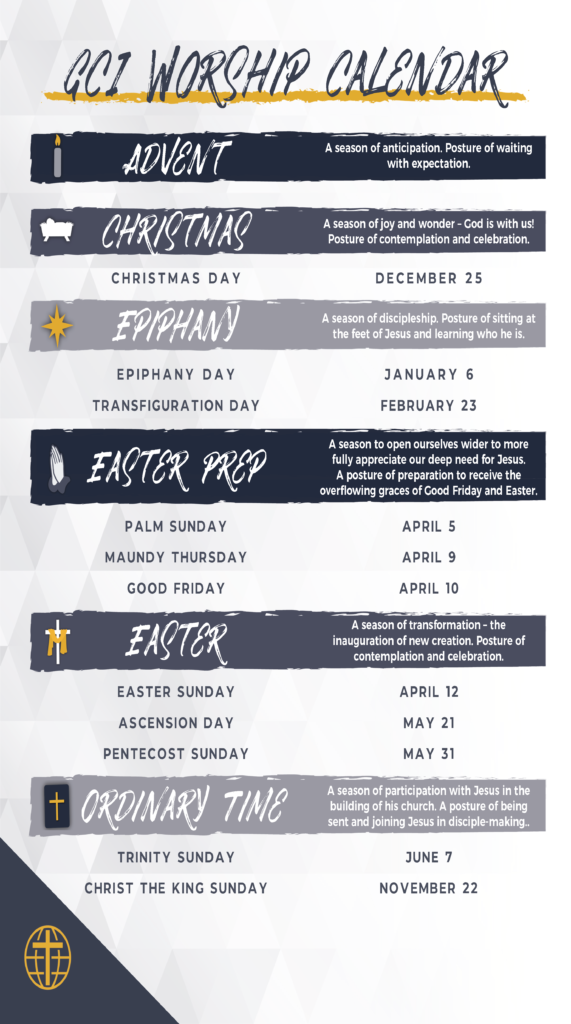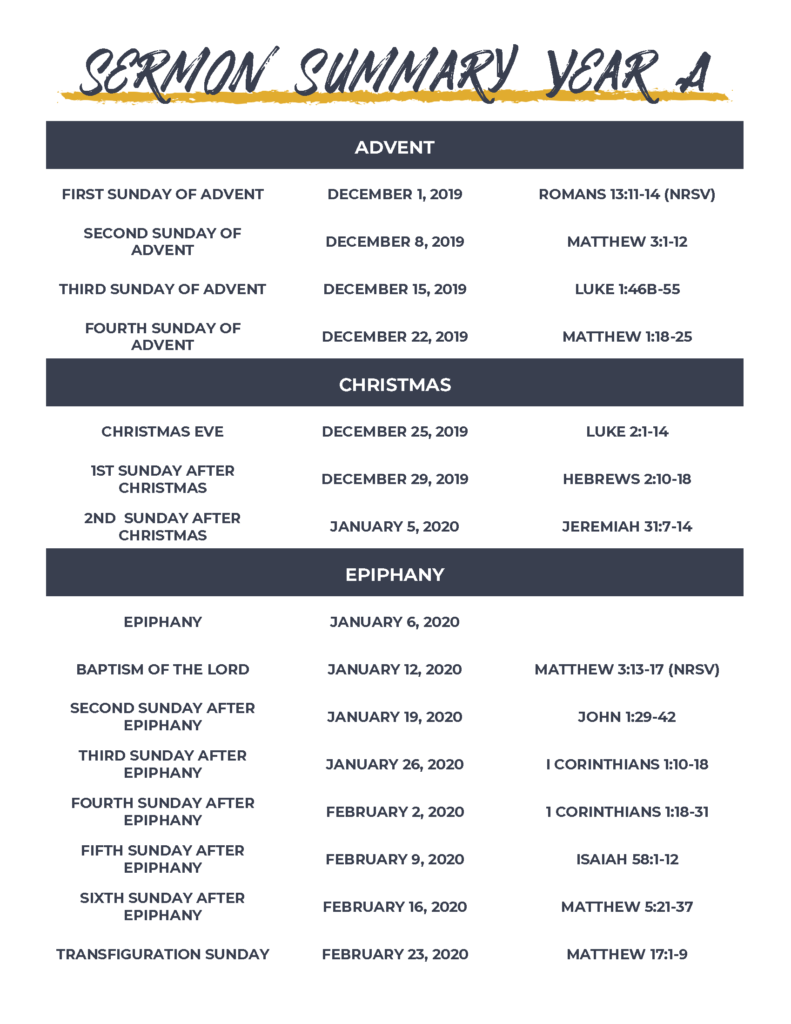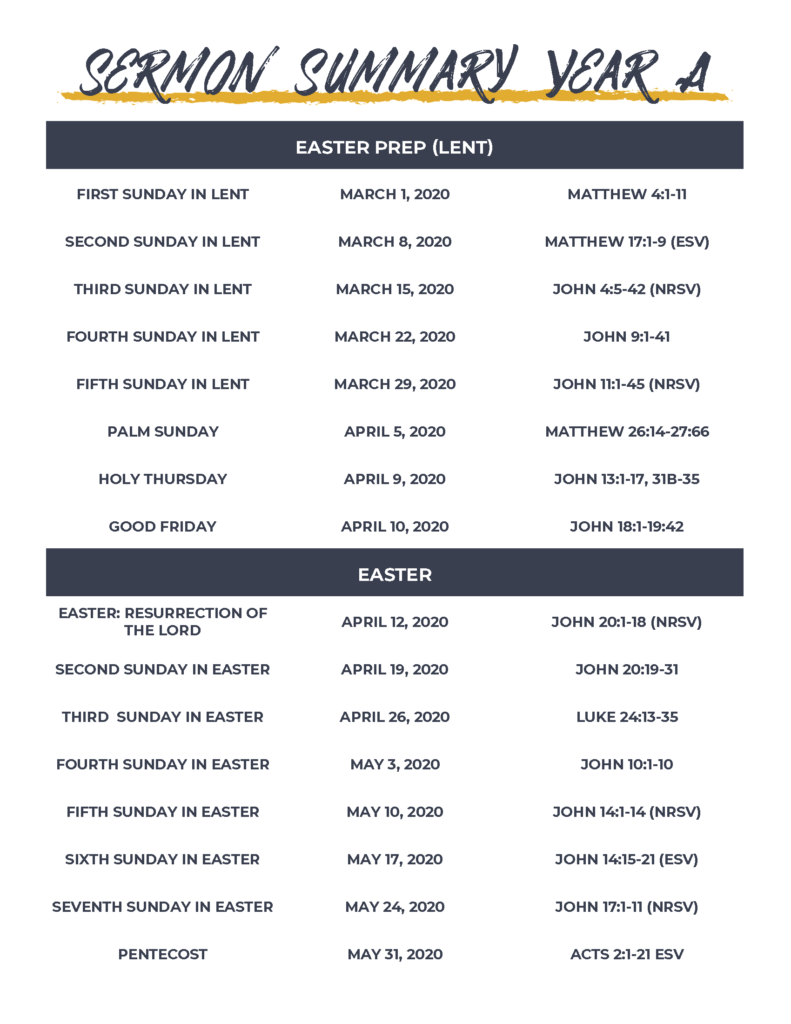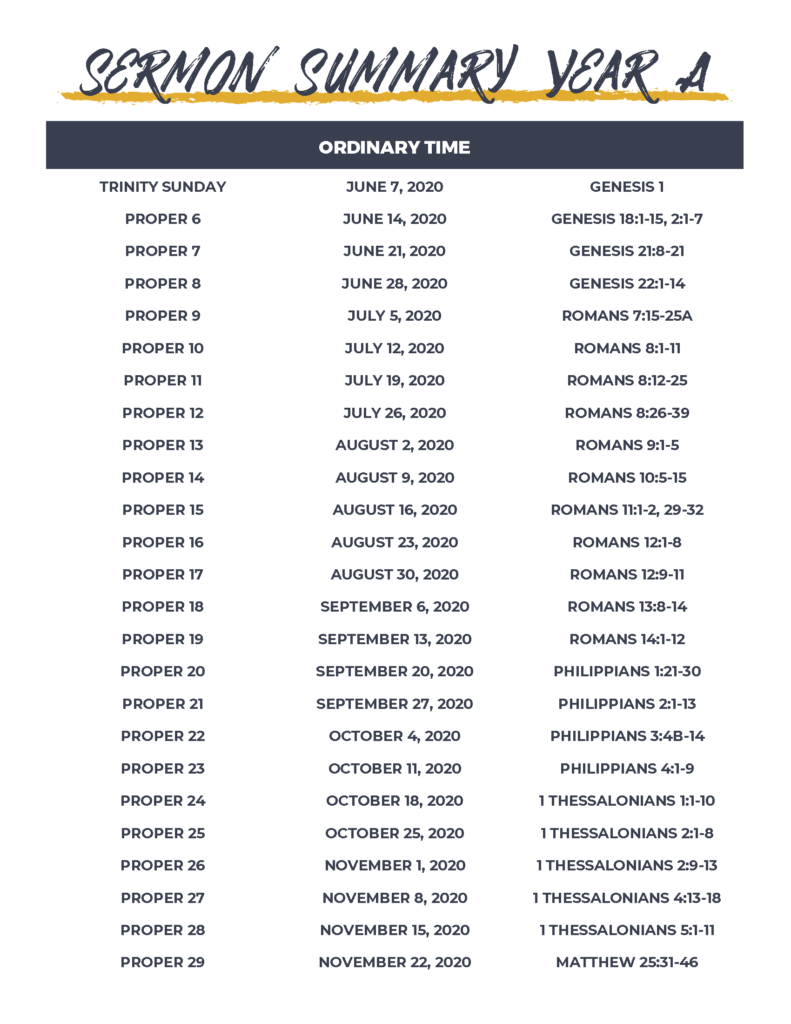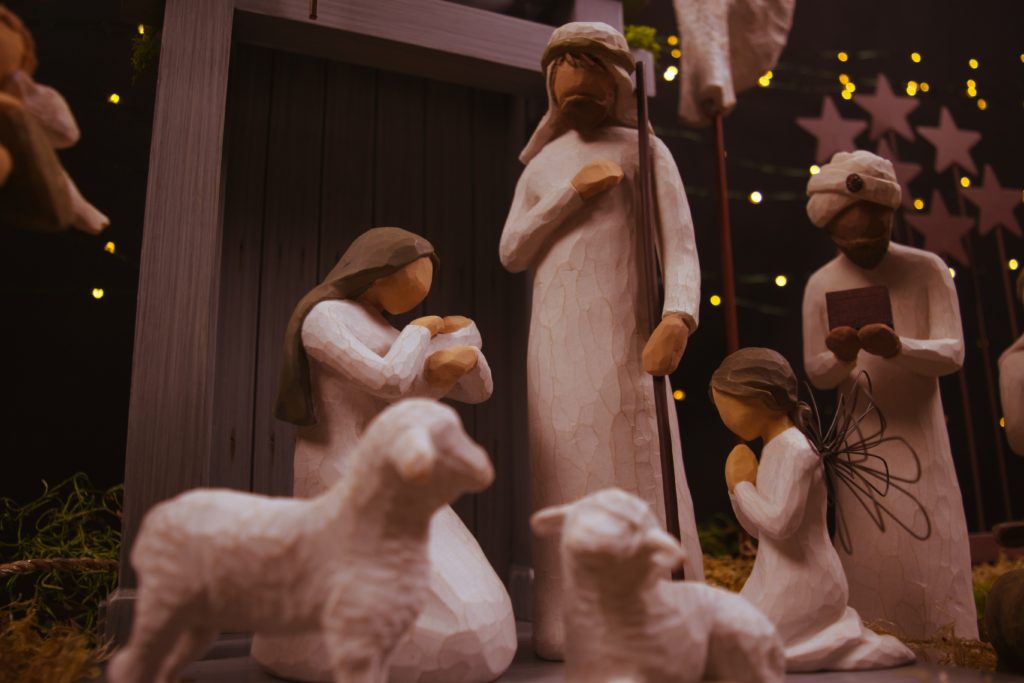Sermon for December 8, 2019
Readings: Isaiah 11:1-10 • Psalm 72:1-7, 18-19 • Romans 15:4-13 • Matthew 3:1-12
The theme of these passages is the arrival of the kingdom. The kingdom, which arrived with Christ, is discussed or hinted at in these passages. Isaiah 11:1-10 describes the kind of supernatural peace and joy of the kingdom. Psalm 72:1-7, 18-19 shares a vision of a kingdom well-ruled which points to the wholeness of the kingdom. In Romans 15:4-13, Paul rings out the call of the gospel to the Gentiles—the unity of the kingdom in that now all people are God’s chosen people. Matthew 3:1-12, on which the sermon is based, tells of John the Baptist heralding the arrival of the rightful king—God himself. Prepare the way of the Lord!
John the Baptist: The Wilderness Voice
Matthew 3:1-12 ESV
Introduction: For a fun introduction, sing, play or read the lyrics to Prepare Ye the Way of the Lord from the musical Godspell.
In the 1970s, the play Godspell was popular. The hit song, “Prepare Ye the Way of the Lord” was a big hit on the radio at the time and has been covered by all kinds of bands ever since.

Many are fascinated with the phrase, “Prepare ye the way of the Lord.” Even in the secular time and society in which the musical was first written, there was a fixation with John the Baptist, and with Jesus. Interesting how the truth of gospel fascinates all people, and always will. God may reach out to you through a song or a play in Greenwich Village in the swinging ’70s if the church doesn’t do the trick.
Prepare ye the way of the Lord…
Today we will look at John the Baptist, this mysterious shadowy figure who comes before Jesus and then quickly disappears. He is the “wilderness voice” in Gospels who is proclaiming that the Messiah is coming, and disrupting the system at the same time. Today let’s look at…
- What it meany in John’s day to be the wilderness voice
- Paying attention to the wilderness voice in our lives
- What it means to be the wilderness voice ourselves.
Let’s read the text:
In those days John the Baptist came preaching in the wilderness of Judea, “Repent, for the kingdom of heaven is at hand.” For this is he who was spoken of by the prophet Isaiah when he said, “The voice of one crying in the wilderness: ‘Prepare the way of the Lord; make his paths straight.’”
Now John wore a garment of camel’s hair and a leather belt around his waist, and his food was locusts and wild honey. Then Jerusalem and all Judea and all the region about the Jordan were going out to him, and they were baptized by him in the river Jordan, confessing their sins. But when he saw many of the Pharisees and Sadducees coming to his baptism, he said to them, “You brood of vipers! Who warned you to flee from the wrath to come? Bear fruit in keeping with repentance. And do not presume to say to yourselves, ‘We have Abraham as our father,’ for I tell you, God is able from these stones to raise up children for Abraham. Even now the axe is laid to the root of the trees. Every tree therefore that does not bear good fruit is cut down and thrown into the fire.
“I baptize you with water for repentance, but he who is coming after me is mightier than I, whose sandals I am not worthy to carry. He will baptize you with the Holy Spirit and fire. His winnowing fork is in his hand, and he will clear his threshing floor and gather his wheat into the barn, but the chaff he will burn with unquenchable fire.” (Matthew 3:1-12 ESV)
It’s interesting that John the Baptist is part of our readings in Advent. When we think Advent, we think Christmas. We think Advent calendars— perhaps with Norman Rockwell paintings, and doors that open and chocolates inside. For Americans, we think of that gooey time of the year between Thanksgiving and Christmas. Just leave “It’s a Wonderful Life” out on the DVD player, and we’ll play it again in a couple weeks! Good-bye family; see you in a few weeks! We don’t usually think of a rough-cut guy like John when we think of Advent.
Yet here he is throughout the Advent season and throughout the Gospels. And he sounds a bit like a wild man wearing a garment of camel’s hair and eating locusts and wild honey.
We must understand that this scene with John the Baptist didn’t look like the traditional clean-cut picture you may have seen in Sunday school—a white guy and a lot of happy white people in their Sunday best out to have a dip and hear a good sermon.
It was more like a protest with screaming and marching and tear gas in the air. More like people throwing rocks in the streets. I’m not advocating any type of protest – what I’m trying to show is what was going on when John the Baptist came on the scene. He was disrupting the system. And like a protester, he was doing so with some powerful symbols.
Matthew says he was in the wilderness. This little detail is very important, especially to his Jewish audience. You might remember a bit of trivia from a long time ago about the book of Numbers. Numbers is our English title for it, but the original Hebrew title was “Into the Wilderness” or “In the Desert.” The Wilderness—a wild, untamed, dangerous place—is where the story of God’s people started.
So, our first point: What it means in John’s day to be the wilderness voice
John is out in that wilderness, and as it says in verse 6: “they were baptized by him in the river Jordan.” John is in the wilderness, and he’s taking them through the water. Does this sound familiar to anyone? John is taking them through the Jordan for a specific reason. He is re-enacting the story of the Exodus—God’s deliverance of Egypt. And now it will be God’s deliverance of all people in Christ.
The Jews were familiar with a similar story of one coming out of the wilderness—Elijah. In 2 Kings 1 we find the story of messengers of the king of Samaria telling the king about a man who gave them a message. When he asked them to describe the messenger they said:
“He had a garment of hair and had a leather belt around his waist.” The king said, “that was Elijah, the Tishbite.” (2 Kings 1:8)
Like Elijah, John the Baptist ate what was provided for him. “His food was locusts and wild honey.” The wild honey sounds OK, but locusts? One internet ad talked about the current trend of locust eating: “the crunchy, kosher snack that’s taking Israel by swarm.” Yuck!
We need to be careful with biblical interpretation here. Does God want us all to go eat bugs? Is that the message? No, the message here is that John, like Elijah before him, had dropped out society. He had gotten off the rollercoaster, out of commerce, even out of how most people got food. He is in the desert eating only what God provides directly off the land. There wasn’t a pocket in his camel skin coat with a wallet in it; he wasn’t amassing a fortune or trying to start a political party.
He was the wilderness voice. Just as the prophets before him, especially Elijah, he was someone outside the everyday, self-centered rhythms of human society who was calling for something very new and something very old at the same moment.
Prepare ye the way of the Lord…
“Repent, for the kingdom of heaven is at hand.” For this is he who was spoken of by the prophet Isaiah when he said, “The voice of one crying in the wilderness: ‘Prepare the way of the Lord; make his paths straight.’” (Matthew 3:1-3 ESV)
Now, at that time in history, the Jewish people had come up with a way for Gentile converts to enter their community. When the Gentile wanted to convert, he would be baptized. It was, not an uncommon practice by the time John came along. So, he’s evangelizing, kind of.
Why is everyone so mad at him? Why does he eventually have some sort of run in with an hors d’oeuvres plate in the palace of Herod? What’s everyone so mad about?
Who is he baptizing? He is baptizing Jewish people. He is converting the already converted. Remember that Jesus hasn’t done his work yet, so John’s not preaching the gospel here, like we might. He was calling his people back to the ways of God to prepare for the movement of God, and he was doing so in the boldest, rawest way possible—he’s telling them they have to start over.
What if we held an altar call at church Sunday morning only for those who are already Christians? What if you told Billy Graham that he needed to get saved? That’s what we’re looking at here. John is telling them they need to get back to square one.
To the people whose ancestors came from the wilderness, a voice comes out of that wilderness. To the people whose ancestors passed through the parted sea, he calls them to plunge back into the waters. To the people who practice baptism to bring in new converts, he offers baptism.
The wilderness voice! Not exactly Amy Grant’s Christmas album. But it is still a vital part of the journey of God’s people.
One of my favorite stories of church history is about Bishop Nicholas, who you all may recognize. Later known as St. Nicholas, or St. Nick, his red and white robe is the one thing that lasted. He’s the guy that Santa is based on. But the real Bishop Nicholas in the 3rd century was a strong leader fiercely devoted to the gospel. A particular heretic was gathering a following in the 3rd century at one of the first ever conferences of the global church at the time. Old St. Nick got tired of this guy carrying on, so he jumped down off his throne and punched this guy right in the nose!
John the Baptist is much the same. He is disrupting the system. He is breaking down the old barriers and the old sophistications. Sometimes the voice of God is like this, isn’t it? In order for the new to grow, the old has to be taken away, stripped off, knocked in the nose sometimes.
The voice from the wilderness shakes us, gets our attention, and says “This isn’t all there is! There is more to life, more to God, more to love than just what we’re looking at!”
John spoke to get the people’s attention. His heralding verse can actually be punctuated in two ways:
I’m the voice of one crying in the wilderness, “Prepare ye the way of the Lord!”
I’m the voice of one crying, “In the wilderness prepare ye the way of the Lord!”
Christmas can be one of the most disappointing times of the year, , and I’m not talking about how sad you might feel at not getting the present you hoped for. Christmas is the height of our culture’s longing for connection with something greater than themselves, when the “god-shaped hole” in everyone’s heart is particularly open wide. As we stampede into WalMart at 4 a.m. for the Black Friday special, or we watch sentimental movie marathons and spend hundreds of thousands on plane tickets just to see each other for a moment, are we deeply searching for ways for fill our greater need—connection with God? When we are in the wilderness, John tells us to ache for connection with God—this is the taproot, the lifeline of our lives.
John is saying, “Pay attention!” Those of us in the kingdom who know that Christmas—or any other celebration or achievement or possession or relationship on earth—can’t fill us and heal us. Our lives are not pinned on whether we get the right widescreen TV or whether we get those reservations at the right restaurant,—our lives are pinned on Jesus. We want to make straight a path in this wilderness for the Christ of Christmas. We want to share that Jesus is our hope.
John calls out to those of us who know there is something wrong, something missing, something that needs to be reconnected. Jesus is the message of hope for all of humanity. Sometimes it takes the wilderness voice, who has jumped out of society’s rhythms and tail-chasing to remind us of that truth.
How will you prepare him room this Advent? How will you make space in your heart in the midst of black Friday stampedes and close-out sales and distracting sentimentality for the Lord of all the universe? Many of us choose to give more this holiday season, and that’s wonderful. It’s usually the season the church depends on for larger offerings. Many of us will choose to volunteer, which is also wonderful, to give of our time when so much focus is on receiving.
But let’s also look just to the side of us this season. Do you see that tired single mom trying to get her shopping cart out? Do you see people fighting over that Xbox on black Friday? Sit that one out. Buy that mom a coffee. Be a symbol of grace in the jungle of human greed this year. Be a symbol of the hope that is far beyond and far greater than any earthly holiday can bring us.
Now, our second point: What is the wilderness voice in your life today?
Where is God calling you to change—change not in just your mind, but your heart and your actions, the deepest part of who you are? Where are those wounds that Jesus is pointing out deep in you that need healing?
Where is that voice that God is using to call you attention? It may not feel especially wonderful, but God speaks that way sometimes. Sometimes his voice will come to you in the form of someone in camel hair, eating bugs, whose eyes don’t exactly meet. Pay attention.
Finally: Is God calling you to be the wilderness voice?
Is God calling you to speak into a situation or a culture or a group that is going wrong? We think of Christians like Dorothy Day, who spoke up for the rights of women and the poor in her day, and paid for it. Or Rosa Parks, whose most famous quote is “…nah.” She spoke up as the wilderness voice against the racism of her day and paid for it dearly.
Or even some of the most mundane, small details. Chick Fil-a restaurants, which we all know and love, have refused to open their doors on Sundays. They have set it apart, said this day is holy and it is a day to remind us of our great hope. Other restaurants, I believe Burger King and Wendys, have said they would be devastated if Chick-fil-a opened on Sundays. But Chick Fil-A’s owners have refused to change. They believe that the bedrock reality, the reality of Christ, is more important than who sells the most sandwiches. Will God call you to stand out and to stand up? To say my hope and my identity is rooted somewhere far beyond this world?
Now, if that is the case, look at how John approached that high calling.
He first took care of himself. He first made sure he was listening to his own voice. He lived out in the wilderness, eating and clothing himself with only what God provided. Are we able to live with that kind of radical trust? He could speak out of it because he lived it first, not just because he felt like saying it.
There is no shortage of Christians and others out there who elect themselves to be a “voice in the wilderness.” They are ready to judge the world and think of themselves as martyrs. Is that what you want to do? Before you speak with the wilderness a voice, have you been to the wilderness? Are you living in complete dependence on God, forsaking the ways of the world?
We live in a culture, that right now, especially in a time of transition and frustration, romanticizes the wilderness voice. The church has a tendency to do this too, but in our case, it becomes an idol. As if all there is to do as Christians is decry our culture. As our culture drifts further away from its traditional roots, this comes up a lot. We can sometimes justify our judgmentalism and raging frustration because we think we are speaking prophetically. And in the wider culture, especially among younger people, there’s a fascination with those who tear down, those who protest, those who yell the loudest.
Which brings us to the most important thing John the Baptist ever said, John 3:30: “He must increase, I must decrease.” Jesus said there was no greater prophet born of woman than John the Baptist. That is a ringing endorsement, for sure. There is no greater wilderness voice in history, and yet when Christ arrived, “He must increase, I must decrease.”
When we speak that wilderness voice into our culture and the church, we must leave the stage when God arrives. When God starts changing hearts, we give him the spotlight immediately. A great statement many Christians throughout history have used is this: “It is the Holy Spirit’s job to convict, God’s job to judge, and my job to love.” The most important thing John the Baptist ever said, in the right circumstances and in the right moment, was good-bye. He prepared the way, and when Christ came, he got out of the way. We know very little about him after that, and that was exactly the way he wanted it. Praise God.
Prepare ye the way of the Lord…
Small Group Discussion Questions
From “Speaking of Life”:
- What do you think was going through Isaiah’s mind as he faced the destruction of his nation, and God inspired the prophecy of Jesus?
- Share a time when all seemed lost to you, and God gave you a glimmer of hope.
From the sermon:
- Has God ever spoken to you through someone you didn’t expect? Maybe someone from a different culture or value-system, an outsider like John the Baptist?
- We talked about John the Baptist as the “wilderness voice”—someone who dropped out of society so he could hear from God and speak for God. How do yo think him going “off the grid” helped him fulfill this role?
- John got into trouble for baptizing those who were already Jewish. This was a highly offensive symbolic act that disrupted society. Does God still use disruption—of society and our own lives—to speak to us?
- How is God getting our attention this Advent? Is there somewhere he’s calling us to “prepare the way” for him in our own lives and in our community?
- When Jesus arrives—in our lives, our churches, and our communities—how do we “decrease”? How do we let him take the stage?
Quote to ponder: “The folks you’re shutting out of the church today will be leading it tomorrow. That’s how the Spirit works. The future’s in the margins.” —Rachel Held Evans
Readings: Isaiah 11:1-10 • Psalm 72:1-7, 18-19 • Romans 15:4-13 • Matthew 3:1-12
The theme of these passages is the arrival of the kingdom. The kingdom, which arrived with Christ, is discussed or hinted at in these passages. Isaiah 11:1-10 describes the kind of supernatural peace and joy of the kingdom. Psalm 72:1-7, 18-19 shares a vision of a kingdom well-ruled which points to the wholeness of the kingdom. In Romans 15:4-13, Paul rings out the call of the gospel to the Gentiles—the unity of the kingdom in that now all people are God’s chosen people. Matthew 3:1-12, on which the sermon is based, tells of John the Baptist heralding the arrival of the rightful king—God himself. Prepare the way of the Lord!
John the Baptist: The Wilderness Voice
Matthew 3:1-12 ESV
Introduction: For a fun introduction, sing, play or read the lyrics to Prepare Ye the Way of the Lord from the musical Godspell.
In the 1970s, the play Godspell was popular. The hit song, “Prepare Ye the Way of the Lord” was a big hit on the radio at the time and has been covered by all kinds of bands ever since.

Many are fascinated with the phrase, “Prepare ye the way of the Lord.” Even in the secular time and society in which the musical was first written, there was a fixation with John the Baptist, and with Jesus. Interesting how the truth of gospel fascinates all people, and always will. God may reach out to you through a song or a play in Greenwich Village in the swinging ’70s if the church doesn’t do the trick.
Prepare ye the way of the Lord…
Today we will look at John the Baptist, this mysterious shadowy figure who comes before Jesus and then quickly disappears. He is the “wilderness voice” in Gospels who is proclaiming that the Messiah is coming, and disrupting the system at the same time. Today let’s look at…
- What it meany in John’s day to be the wilderness voice
- Paying attention to the wilderness voice in our lives
- What it means to be the wilderness voice ourselves.
Let’s read the text:
In those days John the Baptist came preaching in the wilderness of Judea, “Repent, for the kingdom of heaven is at hand.” For this is he who was spoken of by the prophet Isaiah when he said, “The voice of one crying in the wilderness: ‘Prepare the way of the Lord; make his paths straight.’”
Now John wore a garment of camel’s hair and a leather belt around his waist, and his food was locusts and wild honey. Then Jerusalem and all Judea and all the region about the Jordan were going out to him, and they were baptized by him in the river Jordan, confessing their sins. But when he saw many of the Pharisees and Sadducees coming to his baptism, he said to them, “You brood of vipers! Who warned you to flee from the wrath to come? Bear fruit in keeping with repentance. And do not presume to say to yourselves, ‘We have Abraham as our father,’ for I tell you, God is able from these stones to raise up children for Abraham. Even now the axe is laid to the root of the trees. Every tree therefore that does not bear good fruit is cut down and thrown into the fire.
“I baptize you with water for repentance, but he who is coming after me is mightier than I, whose sandals I am not worthy to carry. He will baptize you with the Holy Spirit and fire. His winnowing fork is in his hand, and he will clear his threshing floor and gather his wheat into the barn, but the chaff he will burn with unquenchable fire.” (Matthew 3:1-12 ESV)
It’s interesting that John the Baptist is part of our readings in Advent. When we think Advent, we think Christmas. We think Advent calendars— perhaps with Norman Rockwell paintings, and doors that open and chocolates inside. For Americans, we think of that gooey time of the year between Thanksgiving and Christmas. Just leave “It’s a Wonderful Life” out on the DVD player, and we’ll play it again in a couple weeks! Good-bye family; see you in a few weeks! We don’t usually think of a rough-cut guy like John when we think of Advent.
Yet here he is throughout the Advent season and throughout the Gospels. And he sounds a bit like a wild man wearing a garment of camel’s hair and eating locusts and wild honey.
We must understand that this scene with John the Baptist didn’t look like the traditional clean-cut picture you may have seen in Sunday school—a white guy and a lot of happy white people in their Sunday best out to have a dip and hear a good sermon.
It was more like a protest with screaming and marching and tear gas in the air. More like people throwing rocks in the streets. I’m not advocating any type of protest – what I’m trying to show is what was going on when John the Baptist came on the scene. He was disrupting the system. And like a protester, he was doing so with some powerful symbols.
Matthew says he was in the wilderness. This little detail is very important, especially to his Jewish audience. You might remember a bit of trivia from a long time ago about the book of Numbers. Numbers is our English title for it, but the original Hebrew title was “Into the Wilderness” or “In the Desert.” The Wilderness—a wild, untamed, dangerous place—is where the story of God’s people started.
So, our first point: What it means in John’s day to be the wilderness voice
John is out in that wilderness, and as it says in verse 6: “they were baptized by him in the river Jordan.” John is in the wilderness, and he’s taking them through the water. Does this sound familiar to anyone? John is taking them through the Jordan for a specific reason. He is re-enacting the story of the Exodus—God’s deliverance of Egypt. And now it will be God’s deliverance of all people in Christ.
The Jews were familiar with a similar story of one coming out of the wilderness—Elijah. In 2 Kings 1 we find the story of messengers of the king of Samaria telling the king about a man who gave them a message. When he asked them to describe the messenger they said:
“He had a garment of hair and had a leather belt around his waist.” The king said, “that was Elijah, the Tishbite.” (2 Kings 1:8)
Like Elijah, John the Baptist ate what was provided for him. “His food was locusts and wild honey.” The wild honey sounds OK, but locusts? One internet ad talked about the current trend of locust eating: “the crunchy, kosher snack that’s taking Israel by swarm.” Yuck!
We need to be careful with biblical interpretation here. Does God want us all to go eat bugs? Is that the message? No, the message here is that John, like Elijah before him, had dropped out society. He had gotten off the rollercoaster, out of commerce, even out of how most people got food. He is in the desert eating only what God provides directly off the land. There wasn’t a pocket in his camel skin coat with a wallet in it; he wasn’t amassing a fortune or trying to start a political party.
He was the wilderness voice. Just as the prophets before him, especially Elijah, he was someone outside the everyday, self-centered rhythms of human society who was calling for something very new and something very old at the same moment.
Prepare ye the way of the Lord…
“Repent, for the kingdom of heaven is at hand.” For this is he who was spoken of by the prophet Isaiah when he said, “The voice of one crying in the wilderness: ‘Prepare the way of the Lord; make his paths straight.’” (Matthew 3:1-3 ESV)
Now, at that time in history, the Jewish people had come up with a way for Gentile converts to enter their community. When the Gentile wanted to convert, he would be baptized. It was, not an uncommon practice by the time John came along. So, he’s evangelizing, kind of.
Why is everyone so mad at him? Why does he eventually have some sort of run in with an hors d’oeuvres plate in the palace of Herod? What’s everyone so mad about?
Who is he baptizing? He is baptizing Jewish people. He is converting the already converted. Remember that Jesus hasn’t done his work yet, so John’s not preaching the gospel here, like we might. He was calling his people back to the ways of God to prepare for the movement of God, and he was doing so in the boldest, rawest way possible—he’s telling them they have to start over.
What if we held an altar call at church Sunday morning only for those who are already Christians? What if you told Billy Graham that he needed to get saved? That’s what we’re looking at here. John is telling them they need to get back to square one.
To the people whose ancestors came from the wilderness, a voice comes out of that wilderness. To the people whose ancestors passed through the parted sea, he calls them to plunge back into the waters. To the people who practice baptism to bring in new converts, he offers baptism.
The wilderness voice! Not exactly Amy Grant’s Christmas album. But it is still a vital part of the journey of God’s people.
One of my favorite stories of church history is about Bishop Nicholas, who you all may recognize. Later known as St. Nicholas, or St. Nick, his red and white robe is the one thing that lasted. He’s the guy that Santa is based on. But the real Bishop Nicholas in the 3rd century was a strong leader fiercely devoted to the gospel. A particular heretic was gathering a following in the 3rd century at one of the first ever conferences of the global church at the time. Old St. Nick got tired of this guy carrying on, so he jumped down off his throne and punched this guy right in the nose!
John the Baptist is much the same. He is disrupting the system. He is breaking down the old barriers and the old sophistications. Sometimes the voice of God is like this, isn’t it? In order for the new to grow, the old has to be taken away, stripped off, knocked in the nose sometimes.
The voice from the wilderness shakes us, gets our attention, and says “This isn’t all there is! There is more to life, more to God, more to love than just what we’re looking at!”
John spoke to get the people’s attention. His heralding verse can actually be punctuated in two ways:
I’m the voice of one crying in the wilderness, “Prepare ye the way of the Lord!”
I’m the voice of one crying, “In the wilderness prepare ye the way of the Lord!”
Christmas can be one of the most disappointing times of the year, , and I’m not talking about how sad you might feel at not getting the present you hoped for. Christmas is the height of our culture’s longing for connection with something greater than themselves, when the “god-shaped hole” in everyone’s heart is particularly open wide. As we stampede into WalMart at 4 a.m. for the Black Friday special, or we watch sentimental movie marathons and spend hundreds of thousands on plane tickets just to see each other for a moment, are we deeply searching for ways for fill our greater need—connection with God? When we are in the wilderness, John tells us to ache for connection with God—this is the taproot, the lifeline of our lives.
John is saying, “Pay attention!” Those of us in the kingdom who know that Christmas—or any other celebration or achievement or possession or relationship on earth—can’t fill us and heal us. Our lives are not pinned on whether we get the right widescreen TV or whether we get those reservations at the right restaurant,—our lives are pinned on Jesus. We want to make straight a path in this wilderness for the Christ of Christmas. We want to share that Jesus is our hope.
John calls out to those of us who know there is something wrong, something missing, something that needs to be reconnected. Jesus is the message of hope for all of humanity. Sometimes it takes the wilderness voice, who has jumped out of society’s rhythms and tail-chasing to remind us of that truth.
How will you prepare him room this Advent? How will you make space in your heart in the midst of black Friday stampedes and close-out sales and distracting sentimentality for the Lord of all the universe? Many of us choose to give more this holiday season, and that’s wonderful. It’s usually the season the church depends on for larger offerings. Many of us will choose to volunteer, which is also wonderful, to give of our time when so much focus is on receiving.
But let’s also look just to the side of us this season. Do you see that tired single mom trying to get her shopping cart out? Do you see people fighting over that Xbox on black Friday? Sit that one out. Buy that mom a coffee. Be a symbol of grace in the jungle of human greed this year. Be a symbol of the hope that is far beyond and far greater than any earthly holiday can bring us.
Now, our second point: What is the wilderness voice in your life today?
Where is God calling you to change—change not in just your mind, but your heart and your actions, the deepest part of who you are? Where are those wounds that Jesus is pointing out deep in you that need healing?
Where is that voice that God is using to call you attention? It may not feel especially wonderful, but God speaks that way sometimes. Sometimes his voice will come to you in the form of someone in camel hair, eating bugs, whose eyes don’t exactly meet. Pay attention.
Finally: Is God calling you to be the wilderness voice?
Is God calling you to speak into a situation or a culture or a group that is going wrong? We think of Christians like Dorothy Day, who spoke up for the rights of women and the poor in her day, and paid for it. Or Rosa Parks, whose most famous quote is “…nah.” She spoke up as the wilderness voice against the racism of her day and paid for it dearly.
Or even some of the most mundane, small details. Chick Fil-a restaurants, which we all know and love, have refused to open their doors on Sundays. They have set it apart, said this day is holy and it is a day to remind us of our great hope. Other restaurants, I believe Burger King and Wendys, have said they would be devastated if Chick-fil-a opened on Sundays. But Chick Fil-A’s owners have refused to change. They believe that the bedrock reality, the reality of Christ, is more important than who sells the most sandwiches. Will God call you to stand out and to stand up? To say my hope and my identity is rooted somewhere far beyond this world?
Now, if that is the case, look at how John approached that high calling.
He first took care of himself. He first made sure he was listening to his own voice. He lived out in the wilderness, eating and clothing himself with only what God provided. Are we able to live with that kind of radical trust? He could speak out of it because he lived it first, not just because he felt like saying it.
There is no shortage of Christians and others out there who elect themselves to be a “voice in the wilderness.” They are ready to judge the world and think of themselves as martyrs. Is that what you want to do? Before you speak with the wilderness a voice, have you been to the wilderness? Are you living in complete dependence on God, forsaking the ways of the world?
We live in a culture, that right now, especially in a time of transition and frustration, romanticizes the wilderness voice. The church has a tendency to do this too, but in our case, it becomes an idol. As if all there is to do as Christians is decry our culture. As our culture drifts further away from its traditional roots, this comes up a lot. We can sometimes justify our judgmentalism and raging frustration because we think we are speaking prophetically. And in the wider culture, especially among younger people, there’s a fascination with those who tear down, those who protest, those who yell the loudest.
Which brings us to the most important thing John the Baptist ever said, John 3:30: “He must increase, I must decrease.” Jesus said there was no greater prophet born of woman than John the Baptist. That is a ringing endorsement, for sure. There is no greater wilderness voice in history, and yet when Christ arrived, “He must increase, I must decrease.”
When we speak that wilderness voice into our culture and the church, we must leave the stage when God arrives. When God starts changing hearts, we give him the spotlight immediately. A great statement many Christians throughout history have used is this: “It is the Holy Spirit’s job to convict, God’s job to judge, and my job to love.” The most important thing John the Baptist ever said, in the right circumstances and in the right moment, was good-bye. He prepared the way, and when Christ came, he got out of the way. We know very little about him after that, and that was exactly the way he wanted it. Praise God.
Prepare ye the way of the Lord…
Small Group Discussion Questions
From “Speaking of Life”:
- What do you think was going through Isaiah’s mind as he faced the destruction of his nation, and God inspired the prophecy of Jesus?
- Share a time when all seemed lost to you, and God gave you a glimmer of hope.
From the sermon:
- Has God ever spoken to you through someone you didn’t expect? Maybe someone from a different culture or value-system, an outsider like John the Baptist?
- We talked about John the Baptist as the “wilderness voice”—someone who dropped out of society so he could hear from God and speak for God. How do yo think him going “off the grid” helped him fulfill this role?
- John got into trouble for baptizing those who were already Jewish. This was a highly offensive symbolic act that disrupted society. Does God still use disruption—of society and our own lives—to speak to us?
- How is God getting our attention this Advent? Is there somewhere he’s calling us to “prepare the way” for him in our own lives and in our community?
- When Jesus arrives—in our lives, our churches, and our communities—how do we “decrease”? How do we let him take the stage?
Quote to ponder: “The folks you’re shutting out of the church today will be leading it tomorrow. That’s how the Spirit works. The future’s in the margins.” —Rachel Held Evans




